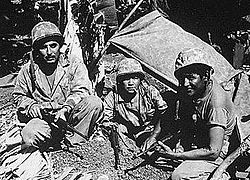 |
| Navajo Code Talkers, Saipan, June 1944 (Source) |
Not only was the Navajo language extremely difficult for them to crack, but U.S. forces were using code words within the language that wouldn't make logical sense. That made the language itself more difficult to crack, and even if they did figure it out, they still had the code to deal with. (More info here.)
This is an early (and may I add awesome) example of encryption.
One of the panels I attended while at LTUE was entitled Cryptography 101. I went to this panel kind of as a default fallback because I didn't have anything I particularly wanted to hear about that hour. To my great surprise, not only was it a fascinating panel, but it really got my creative juices flowing.
Cryptography is simply taking information and making it difficult or impossible for people to understand it if you don't want them to. It's also used for non-repudiation.
- It's important to know that encryption doesn't keep people from breaking in to something, be it a place or simply a batch of sensitive information. What it does do is slow them down. Slowing them down either allows the encryptors to catch them, or at least be able to trace them.
- When someone breaks into or steals something, they don't want to leave a trace. Encryption security is all about keeping the trace there.
 |
| Matrix Encryption (Source) |
It made me smile. Especially because, for the most part, I was able to follow what they were saying, even if there's no way I could re-create it here. I was proud of that.
But so what, right?
I don't write techno thrillers, so how did this stir up my creative juices? That came mostly from what they did discuss of early cryptography.
 |
| Source |
- The ancient Romans often wore their keys as rings, so they were always with them. (Interesting detail for a story, right?)
- And back when the railroad was big, keys were often needed for various important operations, even outside the trains.
 |
| Dwarf Runes (Source) |
If you need a way to flesh out your story, put some hidden information in that your characters need. Make it hard for them to get at in some way. Create a code, a key, and a mystery. This is the stuff of excellent stories and will keep your readers salivating.
As I listened to the panel, my mind went to some plot lines I'm trying to fill out in my Dragon Magic series. All of sudden I had a hundred ideas--love it when that happens!--and couldn't wait to get back to the drawing board.
See? This is why I love writing conferences. :D
Do you use cryptography in your writing? How has it benefited you?
Wow this was interesting to read. I'm quite sure I would have been lost a lot of the time. But it would be fun to know and work into a book, wouldn't it?
ReplyDelete